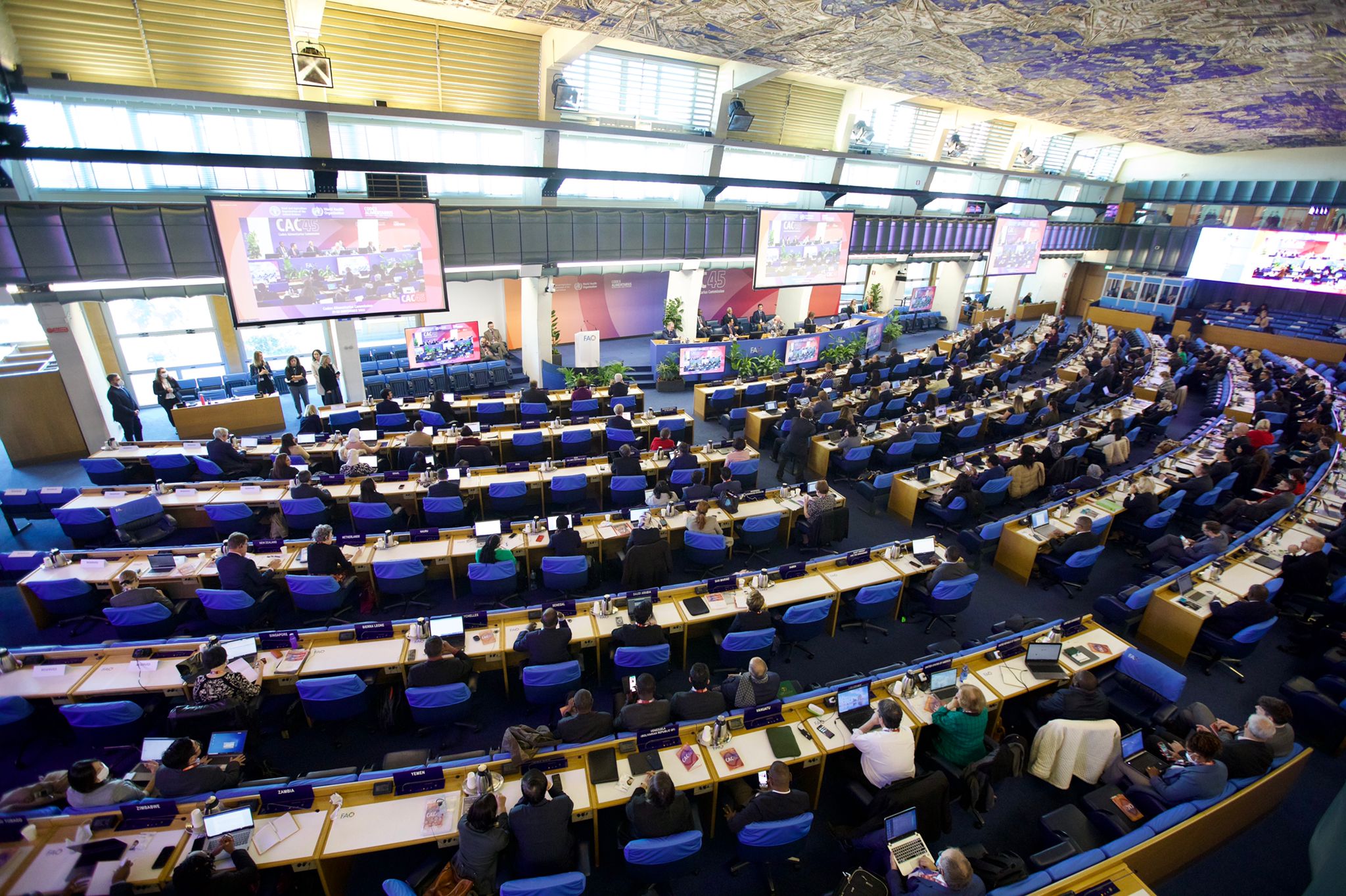
The Codex Alimentarius Commission, jointly created by FAO and the World Health Organization (WHO), is the most important international body in the field of food standards. Since 1963, Codex has developed hundreds of internationally recognized standards, guidelines and codes of practice. It has defined thousands of permitted levels of additives, contaminants and chemical residues in food. The end goal: ensure food is safe for everyone, everywhere.
The Codex Alimentarius Commission (CAC) held its first meeting in 1963. Although the CAC has not met every year in between, 2023 will represent 60 years of activity.

CAC45 plenary, Rome, November 2022 © FAO/Giulio Napolitano
Why we are celebrating a 60th anniversary (Codex@60)
The 44th Session of the Codex Alimentarius Commission (CAC44), held in November 2021, agreed that Codex@60 in 2023 would be a “wonderful occasion” to raise awareness about food safety and quality also in connection with the 5th celebration of World Food Safety Day (WFSD). CAC45 encouraged all Codex Members and Observers to use the opportunity of the Codex 60th Anniversary to plan and implement activities to build awareness of Codex and to engage high level political support for Codex work.
The 82nd Session of Executive Committee of the Codex Alimentarius Commission, which took place in June 2022, further noted the guidance of FAO and WHO in holding a yearlong celebration of Codex@60 and the committee envisaged the anniversary as an opportunity to promote: the essential role Codex still plays impacting consumer health and fair practices in the food trade; the people of Codex, and the future of Codex.
Activities in the Codex Secretariat
For the Codex Secretariat the aim of Codex@60 is to mark the achievements of 60 years of standard setting with an event at CAC46 whilst at the same time relaunching the Codex website and transforming the "food code" of standards, guidelines and codes of practice and the Procedural Manual with a new format and layout and a digital object identifier to track downloads and citations.
Events throughout the Codex world
Codex Members, Observers and all those wishing to mark the 60th anniversary are being encouraged to share their events with the Codex Secretariat for publication on the website and in the Codex@60 special edition of the CAC annual magazine.
The anniversary is an opportunity to showcase the key benefits of Codex standards, though awareness raising events, case studies on impact and other success stories. But is also a chance to reflect on the future of Codex as part of the current global agenda and how it can contribute to the transformation of food systems.
Send your contributions to [email protected].
WEBCAST OF THE CODEX 60TH ANNIVERSARY
Please watch the Webcast of the 60th Anniversary Event - Live from GenevaNews about Codex@60

Codex podcast / Looking back, looking forward

Celebrating the 60th anniversary of Codex in UAE

Codex@60 / Celebrating the international forum for food safety standards

Codex@60 / A seminar and a coffee table book to celebrate India's journey in Codex

Türkiye celebrates 60 years of Codex
.jpg)
Codex Poland posts 60 messages on 60 years of Codex

OIRSA sends anniversary wishes to Codex
.jpg)
Singapore celebrates Codex@60

Codex plays an important part in the mission to end hunger

For healthier populations, we will rely on Codex to continue its work
Key Information
- Codex standards, guidelines and codes of practice deal with everything that can have an impact on the safety or quality of our food
- All Codex food safety work is based on the scientific advice provided by independent expert bodies under the auspices of FAO and WHO
- Codex food safety standards are reference texts in the World Trade Organization (WTO) SPS (Sanitary and Phytosanitary) agreement
- The Codex Alimentarius has become a global reference for trade between countries and has also in many cases led to improvements in domestic production
- Food safety is very much the responsibility of all parties along the value chain, from producer to consumer
- Codex continually reviews its standards to ensure the best possible protection for consumers without unnecessarily restricting trade






